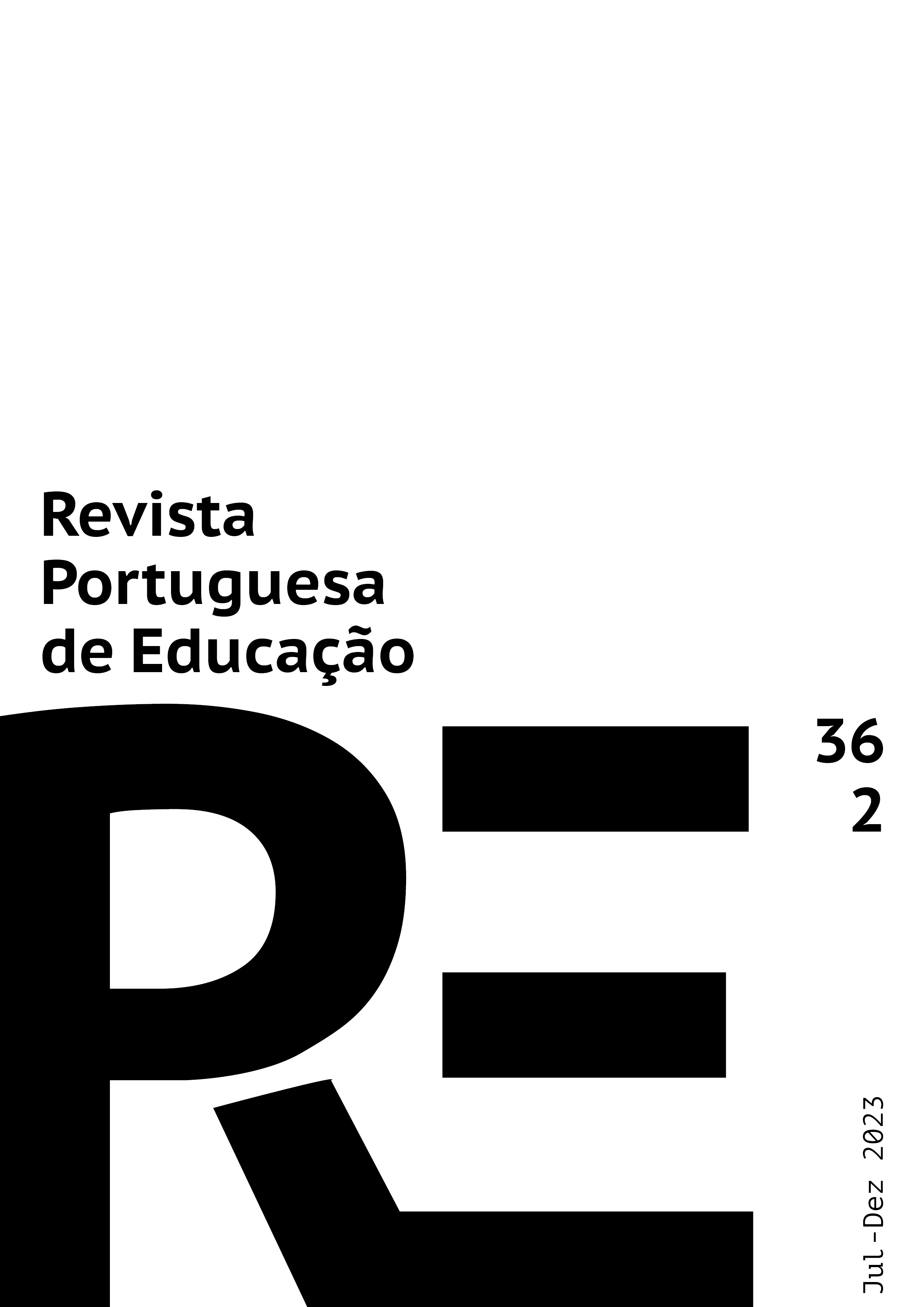TALIS 2018: Comparative analysis of the quality of education in Portugal in relation to the average of OECD countries, according to teachers and school directors
DOI:
https://doi.org/10.21814/rpe.29173Keywords:
TALIS 2018, Portugal, Quality of education, Teachers, School principalsAbstract
The Teaching and Learning International Survey (TALIS) is a study coordinated by the Organisation for Economic Co-operation and Development (OECD) about teaching, learning, classroom environment and the working conditions of teachers and school principals of the 3rd cycle of basic education (CEB), based on their opinions and reports. In this article, we develop a quantitative analysis of Portugal's results, comparing them with the average of OECD countries, based on the values obtained in the 61 indicators quantified in the ten areas defined in the two OECD reports on TALIS 2018 together with the OECD perspective regarding the influence of these indicators in improving the quality of education. We found that: a) for Portuguese teachers, the number of unfavourable indicators for improving the quality of education is much higher than the number of favourable indicators, both in the areas referring to basic skills and knowledge and in those referring to prestige, responsibility and autonomy; b) for Portuguese principals, the number of unfavourable indicators is higher than the number of favourable indicators in the total of all areas. We conclude that, according to principals and teachers (especially the latter), the educational landscape of the 3rd CEB in Portugal is far below the average of OECD countries in relation to the potential for improving the quality of education in this level.
Downloads
References
Albergaria-Almeida, P., Lopes, B., & Martinho, M. (2015). Student assessment strategies in Portugal: an analysis of TALIS 2013. Procedia – Social and Behavioral Sciences, 186, 841-846. https://doi.org/10.1016/j.sbspro.2015.04.143
Fernández-Díaz, M., Rodríguez-Mantilla, J., & Martínez-Zarzuelo, A. (2016). PISA y TALIS ¿congruencia o discrepancia? RELIEVE, 22(1), e6. https://doi.org/10.7203/relieve.22.1.8247
Hanushek, E. A., & Woessmann, L. (2020). A quantitative look at the economic impact of the European Union’s educational goals. Education Economics, 28(3), 225-244. https://doi.org/10.1080/09645292.2020.1719980
Komatsu, H., & Rappleye, J. (2017). A new global policy regime founded on invalid statistics? Hanushek, Woessmann, PISA, and economic growth. Comparative Education, 53(2), 166-191. https://doi.org/10.1080/03050068.2017.1300008
Leigh, A. (2010). Estimating teacher effectiveness from two-year changes in students’ test scores. Economics of Education Review, 29(3), 480-488. https://doi.org/10.1016/j.econedurev.2009.10.010
Lopes, B., Albergaria-Almeida, P., & Martinho, M. (2015). Learning and teaching in Portugal: an analysis of TALIS 2013. Procedia – Social and Behavioral Sciences, 186, 630-636. https://doi.org/10.1016/j.sbspro.2015.04.045
Maia, J. S., Mascarenhas, D., & Rosa, V. (2022). TALIS 2918: A comparison between seven Mediterranean countries. In M. Cruz, A. Couto & F. Lambert (Eds.), Issues’22 - Issues in Education (pp. 7-27). Escola Superior de Educação do Politécnico do Porto. https://www.researchgate.net/publication/362046105_TALIS_2018_a_comparison_between_seven_European_Mediterranean_Countries
Maia, J. S., Rosa, V., Mascarenhas, D., & Teodoro, V. D. (2022). Comparative indices of the education quality from the opinions of teachers and principals in TALIS 2018. Cogent Education, 9(1), e2153418. https://doi.org/10.1080/2331186X.2022.2153418
Maués, O., & Costa, M. (2020). A OCDE e a formação docente: a TALIS em questão. Revista Práxis Educacional, 16(41), 99-124. https://doi.org/10.22481/praxisedu.v16i41.7255
OCDE (2010). TALIS 2008 Technical Report. OECD Publishing. https://read.oecd-ilibrary.org/education/talis-2008-technical-report_9789264079861-en
OCDE (2014). TALIS 2013 Results: an international perspective on teaching and learning. OECD Publishing. https://read.oecd-ilibrary.org/education/talis-2013-results_9789264196261-en
OCDE (2019). TALIS 2018 Results (Volume I): Teachers and school leaders as lifelong learners. OECD Publishing. https://doi.org/10.1787/1d0bc92a-en
OCDE (2020). TALIS 2018 Results (Volume II): Teachers and school leaders as valued professionals. OECD Publishing. https://doi.org/10.1787/19cf08df-en
Rodrigues, N., Santos, J., Pimenta, M., Mestre, C., Saleiro, H., Rafael, J., Direção-Geral de Estatísticas da Educação e Ciência, & Centro Nacional TALIS (2020). TALIS 2018 – Liderança, práticas e valorização profissional de diretores e docentes do 3.º ciclo do ensino básico. Direção-Geral de Estatísticas da Educação e Ciência. https://www.dgeec.mec.pt/np4/451/%7B$clientServletPath%7D/?newsId=1019&fileName=DGEEC_2020_RelatorioNacionalTalis20183.pdf
Rosa, V. (2020). A participação de Portugal no estudo ICILS. EDUSER, 12(2), 1-16. http://dx.doi.org/10.34620/eduser.v12i2.144
Rosa, V., Maia, J. S., Mascarenhas, D., & Teodoro, A. (2020). PISA, TIMSS e PIRLS em Portugal: análise comparativa. Revista Portuguesa de Educação, 33(1), 94-120. https://doi.org/10.21814/rpe.18380
Scheerens, J. (Ed.) (2010). Teachers’ professional development – Europe in international comparison: an analysis of teachers’ professional development based on the OCDE’s Teaching and Learning International Survey (TALIS). European Union. http://dx.doi.org/10.2766/63494
Schleicher, A. (2016). Teaching Excellence through Professional Learning and Policy Reform: Lessons from Around the World, International Summit on the Teaching Profession. OCDE Publishing. https://doi.org/10.1787/9789264252059-en
Schleicher, A. (2020). Teaching and learning international survey TALIS 2018. Insights and interpretations. OCDE Publishing. https://www.oecd.org/education/talis/TALIS2018_insights_and_interpretations.pdf
Sorensen, T., & Robertson, S. (2020). O Programa da OCDE TALIS: enquadrando, medindo e vendendo professores de qualidade. Currículo sem Fronteiras, 20(1), 43-61. http://dx.doi.org/10.35786/1645-1384.v20.n1.4
UNESCO (2021). Repenser nos futurs ensemble: Un nouveau contrat social pour l'éducation. Rapport de la Commission Internationale sur les Futurs de l’Éducation. https://unesdoc.unesco.org/ark:/48223/pf0000379705
Zakariya, Y. (2020). Investigating Some Construct Validity Threats to TALIS 2018 Teacher Job Satisfaction Scale: Implications for Social Science Researchers and Practitioners. Social Science, 9(4), e38. http://dx.doi.org/10.3390/socsci9040038
Downloads
Published
How to Cite
Issue
Section
License
Copyright (c) 2023 Daniela Mascarenhas, Vítor Rosa, João Sampaio Maia

This work is licensed under a Creative Commons Attribution-ShareAlike 4.0 International License.
1. The authors preserve their authorship and grant the Portuguese Journal of Education the right to the first publication. The work is licensed under Creative Commons Attribution License that allows sharing the work with the acknowledgment of initial authorship and publication in this Journal.
2. The authors have the right to take additional contracts separately, for non-exclusive distribution of the published version of their work (e.g. to deposit in an institutional repository or as a book chapter), acknowledging the initial authorship and publication in this Journal.
3. The authors have the permission and are stimulated to post their work online (e.g. in an institutional repository or on their personal website). They can do this at any phase of the editorial process, as it may generate productive changes, as well as increase impact and article citation (see The Open Citation Project).
The work is licensed under Attribution-ShareAlike 4.0 International (CC BY-SA 4.0)




















